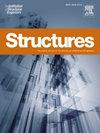具有粘弹性行为的吸附结构:机制、模拟和未来展望综述
IF 3.9
2区 工程技术
Q1 ENGINEERING, CIVIL
引用次数: 0
摘要
将具有负泊松比(NPR)的辅助结构与具有出色阻尼性能和能量吸收能力的粘弹性材料相结合,引入了一种利用每类材料固有特性的合作策略。这为各种应用提供了众多优势,使粘弹性辅助材料(VAM)不仅能抵抗变形,还能根据不断变化的条件进行动态调整。为此,人们对粘弹性辅助材料的构成模型进行了大量研究,探索了一系列结构架构、材料模拟、实验方法、静态和动态性能以及实际应用。为了阐明 VAM 在各个领域的独特潜力,本综述总结了结构配置和材料分类,同时考虑了辅助结构的特殊机械性能和粘弹性行为。本研究的目的是提供数值分析和制造技术的全面概述,同时解决与基于粘弹性的辅助结构的实施相关的挑战,并阐明其能力。本文章由计算机程序翻译,如有差异,请以英文原文为准。
Auxetic structures with viscoelastic behavior: A review of mechanisms, simulation, and future perspectives
The combination of an auxetic structure featuring a negative Poisson’s ratio (NPR) and viscoelastic materials with superior damping behavior and energy absorption introduces a collaborative strategy that utilizes the distinct properties inherent in each category. This provides numerous advantages across various applications, enabling viscoelastic auxetic materials (VAMs) not only to resist deformation but also to dynamically adjust to changing conditions. In these regard, numerous investigations into constitutive models for VAMs have been conducted, exploring a range of structural architectures, materials simulations, experimental methodologies, static and dynamic performance, and practical applications. To clarify the unique potentials of VAMs in various fields, this review presents a summary of structural configurations and classification of materials, considering exceptional mechanical properties of the auxetic structure coupled with viscoelastic behavior. The objective of this study is to provide a comprehensive overview of numerical analysis and fabrication techniques, while also addressing the challenges associated with the implementation of viscoelastic-based auxetic structures and elucidating their capabilities.
求助全文
通过发布文献求助,成功后即可免费获取论文全文。
去求助
来源期刊

Structures
Engineering-Architecture
CiteScore
5.70
自引率
17.10%
发文量
1187
期刊介绍:
Structures aims to publish internationally-leading research across the full breadth of structural engineering. Papers for Structures are particularly welcome in which high-quality research will benefit from wide readership of academics and practitioners such that not only high citation rates but also tangible industrial-related pathways to impact are achieved.
 求助内容:
求助内容: 应助结果提醒方式:
应助结果提醒方式:


